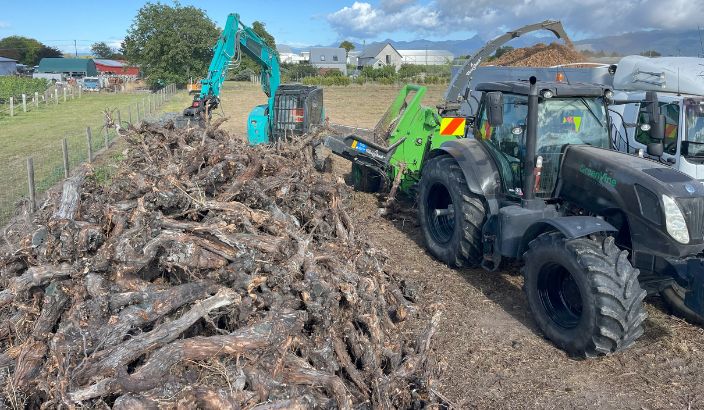Vineyard trash to possible treasure


GreenVine Aotearoa out on site. Photo: Supplied.
An experienced local arborist has seen the region’s vineyard waste and identified an opportunity to turning the waste wood into a regional export.
After 25 years as a qualified arborist, GreenVine Aotearoa’s Jimmy Stewart saw the piles of vine waste and pulled-out plants, which are traditionally burned, and built a business to capitalise on the circular opportunity to reuse the wood more purposefully, while helping vineyard managers get rid of their waste.

As an approximate 20,000 hectares of vines planted in the late 1990s and early 2000s comes up for replacement, Jimmy says GreenVine’s circular model produces much-needed wood products while returning old vineyards to bare paddocks.
“We saw the opportunity ahead in 2023 to help the industry with its vine replacement waste issue and started looking for equipment that can handle the harsh conditions that vine waste brings.
“We pride ourselves on doing post-harvest block management, managing the whole project from start to go - back to bare paddock.
Trial and error meant they settled on a “pretty bomb-proof” German PTO-driven chipper on the back of a tractor. And while grapevine and woodchips are a less-considered export for the region, the need for Marlborough’s waste is keenly felt in wood-poor regions like Canterbury.
“We in Marlborough are in the box seat for producing bulk volumes while utilising a resource from the ongoing waste streams from vineyards ... leaving paddocks ready for replanting.
“Some vineyards just want it chipped and spread back on the land to mulch back into the soil, but there’s so much and massive demand elsewhere for garden and playground mulches, boiler biofuel, calf bedding, and odour suppression in effluent settling ponds. At this stage, the volume produced saturates the local need quickly, so we’re building our supply chains into larger markets like Canterbury and Nelson,” Jimmy added.
